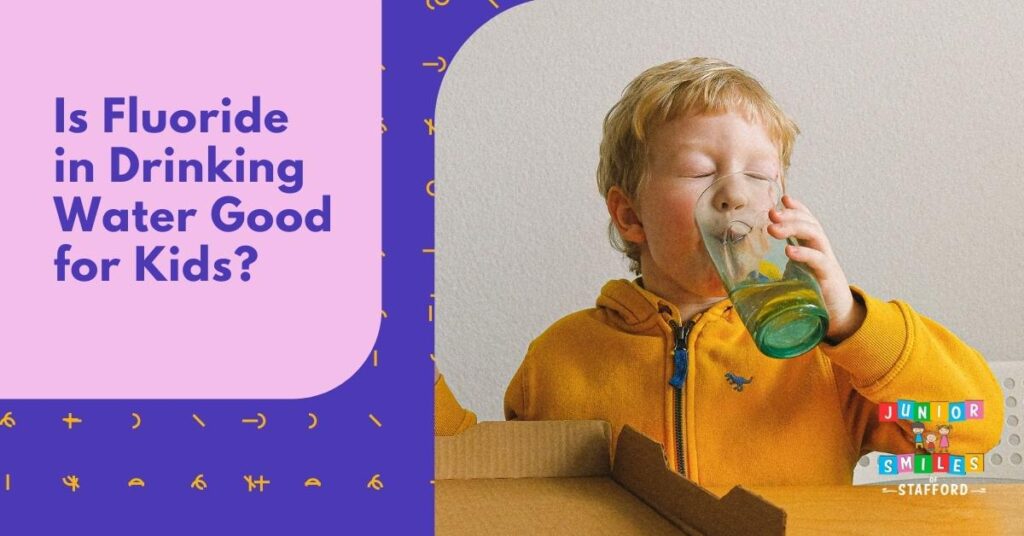Is Baby Water with Fluoride Safe for Drinking?

While nursing isn’t always possible, it’s best for moms to keep it up for the first year. Even while there are good reasons why some families need to take formula, one common side effect is very dangerous for newborns. Concerns regarding the availability of clean drinking water are common among parents nowadays. Particularly because the dentistry community’s standards for what is good for children and adults may not necessarily translate to those for younger patients. Like fluoride, which is a chemical that has been added to drinking water in tap waters from municipal utilities. Some parents are worried that this chemical may harm their infants. To help you decide, we’ve put together this information to help you determine if fluoride in water is safe for your infant.
Fluoride and Early Dental Development
Fluoride, when used in the right dosages, can assist adults and children alike avoid or at least manage tooth decay. Daily use of fluoride after teeth have broken through the gums continues to benefit tooth development. A variety of noticeable alterations to the tooth enamel surface can also be caused by fluoride consumption during tooth growth. Most people now refer to these alterations as dental fluorosis.
Fluorosis, a dental disorder, alters the color and texture of tooth enamel. When youngsters routinely drink fluoride when they are still in the tooth-forming years (about 8 years old), it might lead to this. Fluorosis is more likely to occur in water supplies with fluoride concentrations above 1.5 milligrams per liter, as stated by the World Health Organization.
Choosing Fluoridated Baby Water
When it comes to mixing baby formula, parents have a lot of safe alternatives. Boiling and letting chilled tap water or any kind of bottled water be your two safest bets. In order to ensure that your tap water does not contain more than 0.7 mg/L of fluoride, the American Dental Association recommends contacting your local water provider. To lessen the likelihood of fluoride exposure, use bottled water on occasion if tap water is going to be used mostly for formula. If you’re concerned about giving your infant too much fluoride, another option is to use liquid baby formula. Compared to plain water from the faucet or a standard bottle, the fluoride content of these infant formulae is lower.
Is Fluoride in Baby Water Safe?
The answer is yes, fluoridated water is safe to use while making baby formula. However, babies whose sole source of water is baby formula that has been fluoridated may be at a higher risk of developing minor dental fluorosis. The teeth may get weaker when they come out of the gums and have white lines, stains, discoloration, or pitting as a result of this oral health problem. Be sure to consult your pediatrician and dentist if you notice any symptoms of dental fluorosis in your infant or if you have concerns about the quantity of fluoride your family is taking in. Be aware that there are several places where fluoride can be found. Babies’ exposure to fluoride decreases when they wean off formula and start eating solid meals, but the risk of fluorosis persists until their teeth are fully grown, which is sometimes around the age of 8.
Balancing Fluoride Intake: Dos and Don’ts
Fluoride supplements are often unnecessary for children younger than six months. If you happen to reside in a region devoid of fluoride in the water supply or if your youngster exclusively consumes water from bottles, your physician or dentist may thereafter recommend fluoride supplements. Follow the dosage instructions carefully if your kid’s dentist or doctor recommends fluoride. This will ensure that your child gets the correct quantity of the mineral. Be sure the bottled water you’re using has the appropriate level of fluoride for your infant by reading the label.
If you’re worried about getting too much toothpaste on your baby’s teeth, use a small quantity. Also, avoid using mouthwash. Another thing you shouldn’t do is put your baby’s bottle of formula or milk in the crib.
Considering Fluoride-Free Water Options
Although there is no visual difference between different types of water, not all water sources are reliable. Not only is it an issue of preference, but it is also relevant to the safety of drinking water and, more specifically, the water to be used for formula. To ensure that your water is safe for your infant, the American Academy of Pediatrics (AAP) suggests testing it for nitrates every three months for a year if your house is supplied by a well instead of a public water system. Another alternative is to purchase bottled water in case you are unable or unable to use the water from the faucet, whether it is at home or in a public place. Bottled water that has been filtered, deionized, demineralized, distilled, or made via reverse osmosis is one option that is low in fluoride. When making infant formula, distilled water is another pretty safe option. Even though it’s nutrient-free, the formula will provide all your infant needs. Just like distilled water, purified water undergoes a series of chemical and mineral processes to remove impurities, including fluoride. When combining your powder or liquid-concentrate formula with water, use purified water if you are worried about your infant acquiring fluorosis.
FAQs About Baby Water with Fluoride
When should babies drink water with fluoride?
When applied topically or taken systemically, fluoride helps children older than six months fight tooth decay and preserve their permanent teeth. This protective effect lasts for the lifetime of the child’s teeth.
How much fluoride in water is safe for babies?
The current standard for fluoride in public water supplies is 0.7 mg/L.
What are the side effects of fluoride in drinking water?
Dental fluorosis, skeletal fluorosis, arthritis, bone damage, osteoporosis, muscle damage, exhaustion, joint-related difficulties, and chronic troubles can all be caused by consuming water that has an excess of fluoride ion.
What is the best water for babies to drink?
Potable water that has been boiled and allowed to cool to room temperature, or any bottled water, are the two most secure choices.
What kind of water should you use for baby formula?
For concentrated liquid or powder solution, you can use either clean tap water or bottled water.
Secure Your Baby’s Dental Health with Junior Smiles
Taking care of your child’s teeth starts early on in life. Pay attention to details on their diet, the water used to make their formula, and any other factors that might impact their dental health. To avoid future dental problems, it is essential to practice preventive care. Kids in Stafford, VA should visit the top pediatric dentistry clinic, Junior Smiles, for frequent checkups. Their team of specialists will guarantee that your child’s smiles are always radiant and self-assured.

